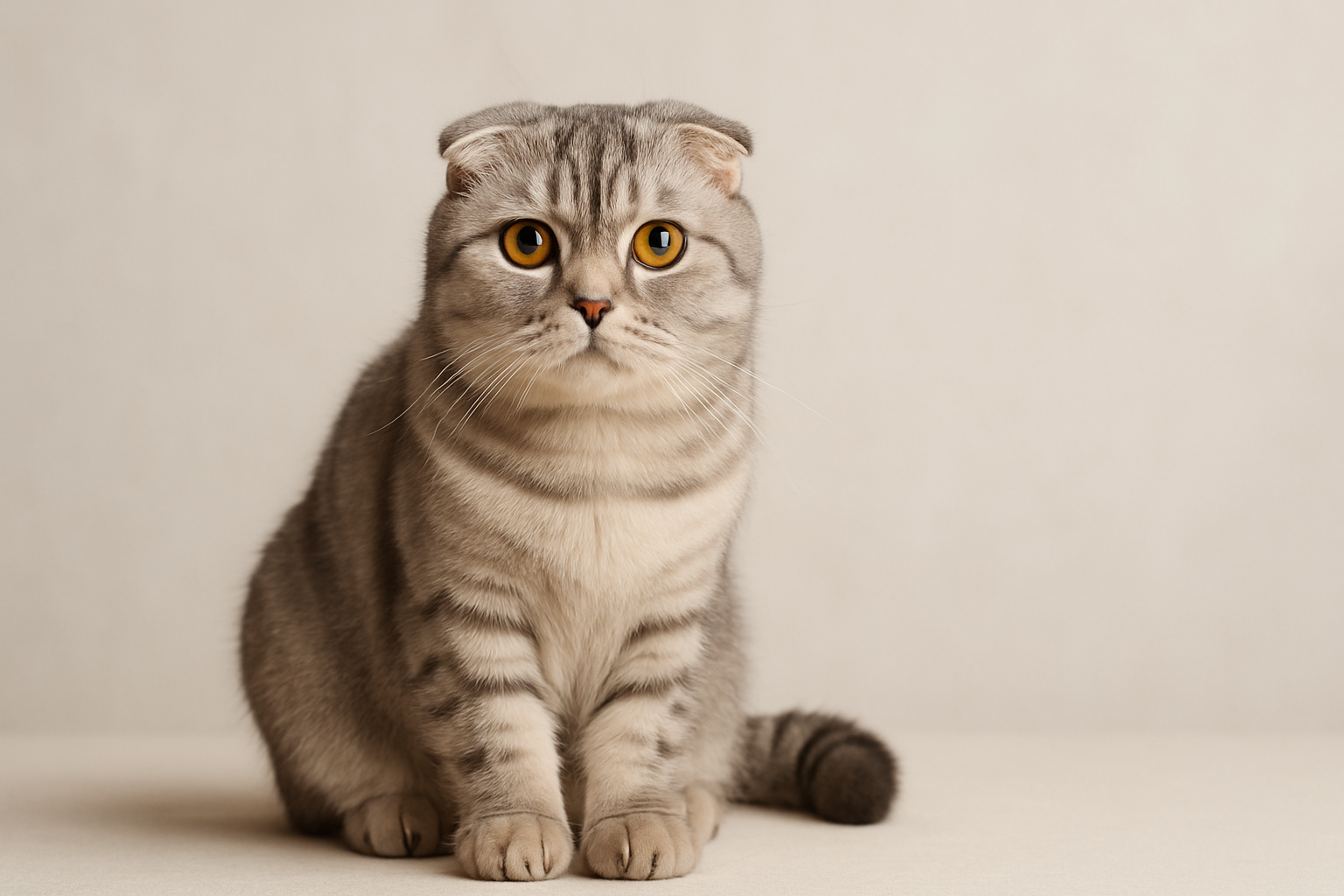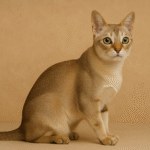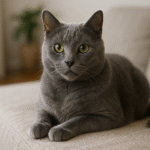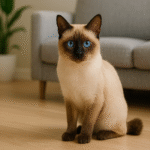Scottish Folds are easy to spot — those folded ears and round, wide-eyed faces give them a look that’s hard to forget. Add in their plush coats and calm personalities, and it’s no wonder they’re one of the most popular indoor cat breeds today. These quiet, affectionate cats love being near their people and do best in homes where they can relax and feel safe.
Thinking about bringing one home? Whether you’re curious about the Scottish Fold cat price, their health needs, or what makes them tick, this guide covers everything you need to know about this adorable breed.
Quick Breed Facts
- Origin: Scotland
- Breed registries: CFA, TICA, GCCF (with limitations)
- Weight range: 6–13 pounds
- Lifespan: 11–15 years
- Coat: Short or long
- Colors and patterns: All colors and patterns accepted
- Eye color: Often matches coat color; copper, blue, green, or odd-eyed
- Grooming: Weekly brushing for shorthairs; more for longhairs
- Activity level: Moderate
- Affection level: High
- Vocality: Quiet and soft-spoken
- Good with children: Yes
- Good with other pets: Usually yes, with proper introduction
History & Origin
The story of the Scottish Fold began in 1961 on a small farm in Scotland. A shepherd named William Ross noticed a white barn cat named Susie with ears that folded forward instead of standing up straight. He was so curious about her unusual ears that he and his wife decided to start a breeding program using her kittens. That simple beginning led to the creation of the breed we know today. Susie’s folded ears came from a natural gene mutation that affects how cartilage forms in the body.
To build a healthy line of cats, breeders crossed Scottish Folds with British Shorthairs and other domestic cats. Some of the kittens had short fur, while others grew into longhaired beauties now known as Highland Folds. As the breed became more popular, scientists and vets started raising concerns about a health issue linked to the folded ear gene. Called osteochondrodysplasia, it’s a condition that can affect bones and joints — especially in the legs and tail.
Scottish Fold Personality
Scottish Folds are known for being gentle, sweet-natured cats who love spending quiet time with their people. They’ll often follow you around the house, curl up beside you on the couch, or perch nearby just to be close. While they aren’t usually clingy lap cats, they form strong bonds with their families and really enjoy calm, gentle attention.
These cats are quiet by nature and rarely meow unless they have something important to say. Their soft voices and mellow vibe make them perfect for apartment life or low-key households. One of their cutest habits? The “Buddha sit” — when they sit upright on their back legs like a little owl. It’s weird, adorable, and very much a Scottish Fold thing.
Appearance & Coat
What makes a Scottish Fold instantly recognizable? Those famous folded ears, of course. The unique fold comes from a natural gene mutation that affects cartilage, and it can range from a gentle bend to a tight little curl. Some kittens are born with straight ears that start to fold around 3 to 4 weeks old, while others stay straight-eared and are known as Scottish Straights.
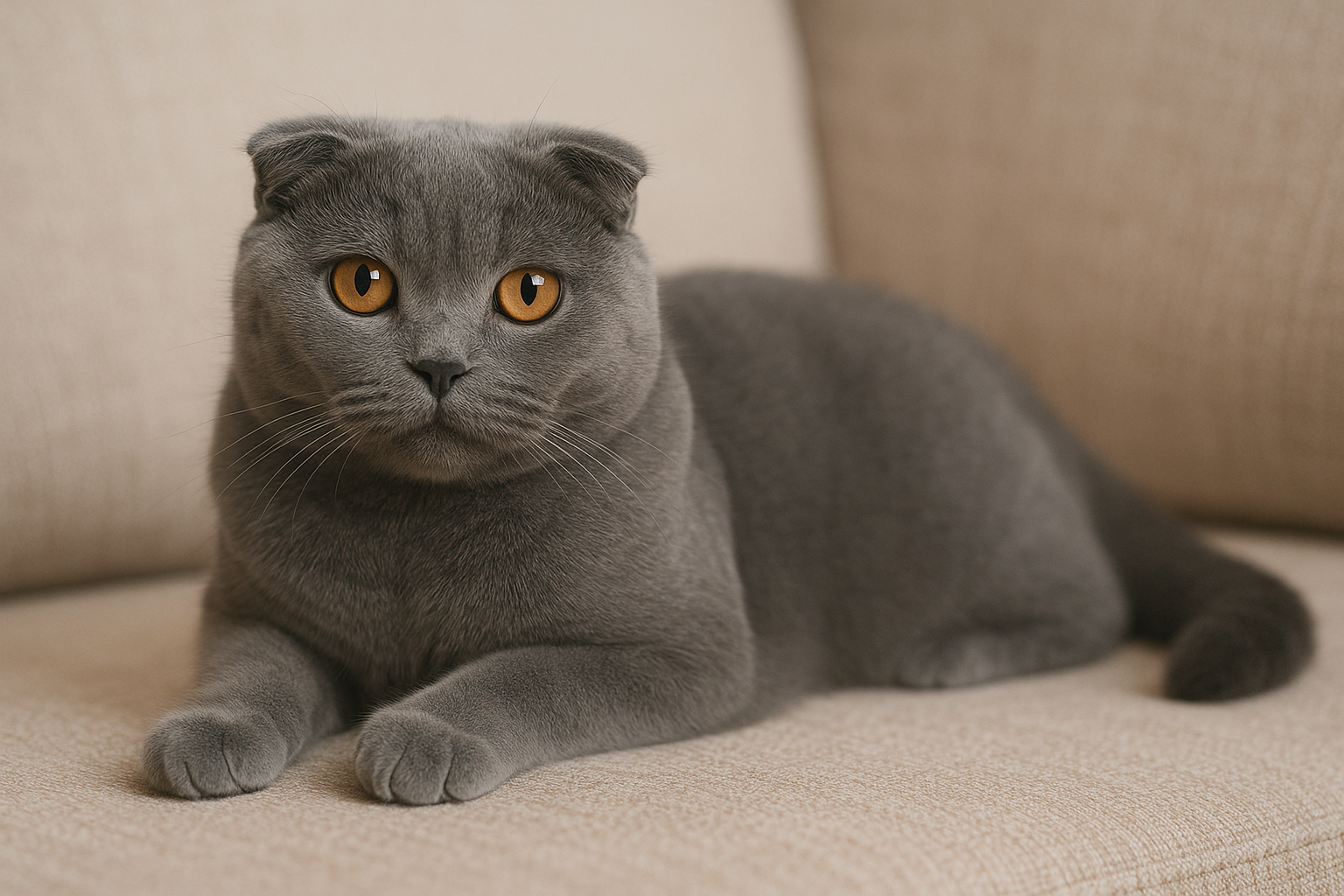
These cats have round faces, big eyes, and a medium-sized, sturdy body. Their coats can be either short or long and come in just about every color and pattern — from solid black or white to tabby, calico, and everything in between. Their fur is soft and plush, and pretty easy to care for with a regular brushing routine.
Activity Level of the Scottish Fold
Scottish Folds aren’t wild or hyper, but they still love to play. They enjoy interactive toys, puzzle feeders, and quiet games of chase around the house. You’ll often find them perched on a windowsill or tucked into a cozy spot, watching the world go by.
Even though they’re pretty laid-back, they still need ways to keep their minds busy. Try rotating toys or offering treat puzzles to keep things fun and interesting. A little play each day goes a long way.
Grooming & Care
Scottish Folds are pretty easy to care for when it comes to grooming. A quick weekly brushing works well for short-haired Folds, while longhaired ones may need more frequent combing to keep their coats tangle-free. Be sure to also trim their nails, check their ears, and brush their teeth regularly.
Their folded ears do need a little extra attention. Because airflow is limited, wax can build up more easily. Gently clean their ears with a vet-approved ear cleaning solution and make sure they stay clean and dry.
Scottish Fold Health Issues & Lifespan
Most Scottish Folds live between 11 and 15 years, especially with good food, a safe home, and regular vet care. One health issue to know about is osteochondrodysplasia — the same gene that causes their folded ears can also affect their joints. Some cats develop stiffness or pain in their legs or tail as they get older.
To lower the risk, responsible breeders often pair Folds with straight-eared cats. But even then, some kittens can still show symptoms. Watch for signs like trouble jumping, a stiff walk, or a tail that doesn’t move much. Regular vet visits (with someone who knows the breed) can help catch problems early and keep your cat feeling their best.
Family Compatibility
Scottish Folds are loving without being clingy, which makes them great companions for just about anyone — families, singles, or seniors. They usually do well with kids and other pets too, as long as introductions are slow and gentle. Their calm personalities help them settle into both quiet homes and livelier ones.
If you’re looking for a chill, affectionate cat that enjoys family life without bouncing off the walls, a Scottish Fold could be just the right match.
Essential Supplies for Scottish Fold Cats
To keep your Scottish Fold happy and healthy, make sure you have the basics covered: high-quality cat food, interactive toys, a cozy bed, and grooming tools. A sturdy scratching post and a clean, low-sided litter box filled with dust-free litter will help protect their sensitive folded ears and keep things tidy.
Because of their calm nature, Scottish Folds also appreciate quiet spots to nap and observe. A window perch or heated bed can quickly become their favorite hangout.
Scottish Fold Cat FAQs
Are Scottish Fold cats hypoallergenic?
No, Scottish Folds are not considered hypoallergenic. Like most cats, they shed and produce allergens in their saliva and dander.
How much does a Scottish Fold cost?
The Scottish Fold price can range from $1,000 to $3,000 depending on lineage, ear fold, and coat type. White and rare colors like black may raise the price.
How long do Scottish Folds live?
With good care, Scottish Folds can live between 11 and 15 years. Some live even longer with regular vet visits and a balanced diet.
What’s the difference between Scottish Fold and Scottish Straight?
Scottish Folds have folded ears due to a genetic mutation, while Scottish Straights have normal, upright ears. Both types can come from the same litter.
How is the Scottish Fold different from the British Shorthair?
Though they share ancestry, British Shorthairs have a chunkier build, rounder face, and straight ears. Scottish Folds are more moderate in build and have distinctive folded ears.
Is the Scottish Fold the Right Cat for You?
The Scottish Fold combines charm, affection, and a one-of-a-kind look into one adorable, low-key companion. Their gentle personalities and cozy habits make them a great choice for anyone looking for a quiet, loving cat that’s easy to live with.
But they do come with some special health considerations, so it’s important to choose a responsible breeder or rescue and stay on top of regular vet care. If you’re looking for a cat that’s both sweet and a little quirky, a Scottish Fold might just be the perfect fit for your home.

